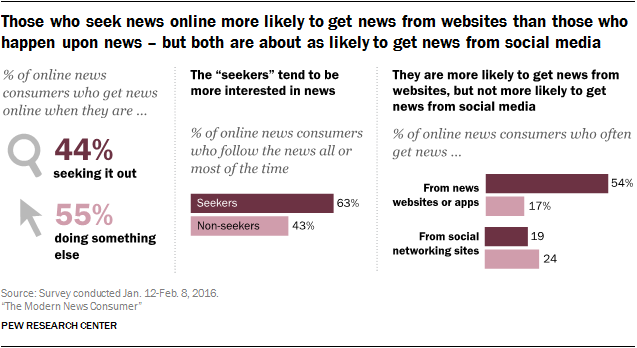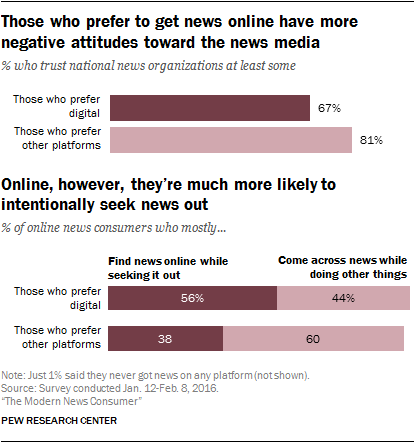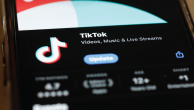Intentionality matters when it comes to online news consumption: those who seek the news out behave differently than those who stumble into news while doing other things online.

- Overall, more digital news consumers get their news online in the process of accomplishing other digital tasks (55%) than specifically seek the news out (44%).
- Those who get news online by seeking it out (“seekers”) are more interested in news overall: 63% say that they follow the news all or most of the time, compared with 43% of those who do not tend to seek out news online.
- Seekers are also more likely than other online news consumers to get news online from news organizations and news websites or apps, though their use of social media as a source for news is about the same when accounting for demographic differences.
- Seekers are less likely to say that friends and family are an important way they get news: 56%, compared with almost seven-in-ten of non-seekers (69%).
- Men and white non-Hispanics are more likely to seek out news online: 51% of men seek out news online, compared with 37% of women, and about half of whites (47%) are seekers, compared with 31% of blacks.
Only about a third of digital news consumers (36%) actually prefer the online world as their primary platform for news.

- Those who prefer digital news (who also tend to be younger adults) have a more negative view of the news media overall. They trust it less (67% trust national news organizations at least some, compared with 81% of others) and sense more media bias: 81% say the media favor one side, compared with 71% of those who prefer other platforms for getting news.1
- Online, though, they demonstrate a more active interest in news, seeking it out rather than just happening upon it while doing other things. They are also more likely to say that getting news online gives them a wider range of news than they would get otherwise.
- Those who prefer to get news online are also more likely to often click on links to news stories on social media (35% of digital preferrers who get news on social media vs. 21% of other social media news consumers) and to at least sometimes post their own news links (42% vs. 32% of others). Those who prefer to get digital news are also more likely than others to share news digitally (27% say this is the most common way they share news, compared with just 8% of others). But even those who prefer digital platforms for news are most likely to share news with others by talking with them.
- Younger adults are more likely to prefer to get news digitally: 54% of those ages 18-29 do, compared with 38% of those ages 30-49, 15% of those ages 50-64 and 7% of those ages 65+. Those with college educations are also more likely to prefer digital: 37% of those with college degrees and 33% of those with some college education, compared with just 17% of those with high school degrees or less.




